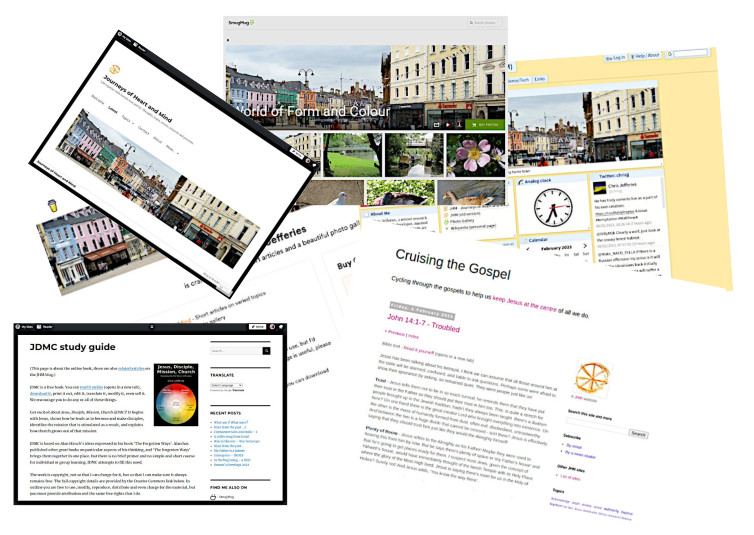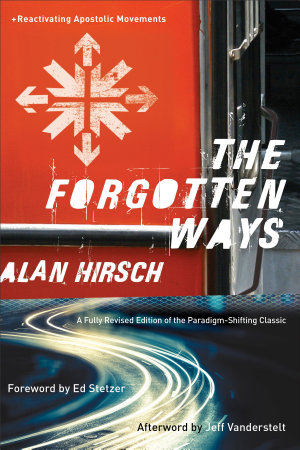Where should we start in church life, where should we start in mission, or in teaching, or in any other aspect of being a believer and follower of Jesus? The answer is simple and rather obvious – we should start with Jesus himself.
Following my post ‘Ground breaking‘ on 26th February, I’d like to examine a particular example. In my study guide, JDMC, I set out to help small groups of individuals live out Jesus’ command to ‘go into all the world and make disciples’. The idea is that making disciples is the first step on the journey to starting a movement that will grow and grow. Alan Hirsch, in setting out this idea in his seminal book ‘The Forgotten Ways’, identified six factors that work together to make a movement buzz and thrive. The first factor is that there needs to be a person and an idea that together can become the focal point for the movement.

A person and an idea
All vigorously growing movements have this centralised focus. For the communist revolution in Russia in the early part of the 20th century the person was Karl Marx and the idea was that wealth should be shared, not held primarily by a ruling class. The means of production should be owned, not by industrialists, but by the workers themselves.
It’s not hard to identify the same structure in all sorts of other historical movements; think of Al Qaeda, the Methodist movement, female suffrage, the rise of the German Nazi party between the first and second world wars, the growth of Amazon as a supply and delivery business. I could go on, there are many examples, and it’s not hard to see a central personality and a central notion or purpose for each.
Jesus is Lord!
In the life of the church the central figure is Jesus and the central idea is that he is Lord. The church was founded on this person and this truth nearly 2000 years ago. He gave us everything we need to become disciples, and he imbued the church with everything it needs to be a thriving, thrusting movement. And although in the first few hundred years, there was explosive growth, a real movement on a major scale, something that swept through the Graeco-Roman world and far beyond – that momentum stalled. Something fundamental, in church today, seems to be missing.
This is the first of six essential ingredients that Alan Hirsch argues that we need to rediscover and reactivate in the church. I think he is right. We need to recover the sense that Jesus is at the heart of church life, and that he is Lord.
It’s fair to argue that this is exactly what Jesus himself meant when he told his disciples to go out into the world and make disciples. But he surrounded that command with some super-important statements. First he said that he has full authority, then he told them to go and make more disciples, he said to teach those new disciples to do all the things he’d taught his initial disciples, and then he finished by telling them that he’d be with them all the way. They did what he’d asked, they made many more disciples who also understood that Jesus is Lord and that they were, in turn, to make more disciples. And they did. And that is a movement! They literally changed their world.
But it’s essential that we do more than just repeat the slogan, ‘Jesus is Lord’. We need to live the slogan out; as disciples of Jesus, we need to do what he did, and to speak into our culture the things he spoke into his culture. He told us to love the people in our lives, he said we should forgive people who are unkind to us. He calls us to imitate his words, but also his thinking and his actions. It’s essential to go as he did, to bless the people around us, to help the helpless, feed the hungry, and meet every need as and when we come across it. Jesus blessed people in many ways, if we are truly his disciples so will we. But as Alan Hirsch points out, there’s more to it than just this one factor. We may be ever so familiar with Jesus, and have a close knowledge of him. We might study him at degree level, publish learned papers about him, write theses about his life and work, and read and write great books about him, and never once see any hint of a rapidly expanding movement.
Knowing Jesus is not, on its own, enough. It is, however an indispensable first step. We do need to know Jesus intimately, to understand who he is, and follow him to the best of our abilities. Yet this alone is insufficient for the rapidly growing movement we would all, surely, like to see! There are five other necessary factors and we will look at another one next time. Alongside the person and the idea there also needs to be a gift. We’ll discuss this in detail in the next part of this short series, but for now it’s enough to know that Jesus is not only the person, and his lordship the idea, but also Jesus himself is the gift. Jesus gave himself for us. This is the supreme gift, but there are others as we shall see.
BUT! In the meantime, get to know Jesus as never before. Spend time discovering him as a person by reading through the gospels of Matthew, Mark, Luke and John. Ask him to reveal himself more fully to you, he is always happy to answer this request, whether you are poor or wealthy, healthy or unwell, highly educated or unable to read. Consider what it means that he is Lord, and consider the cost involved in giving himself and the benefit of that gift to you and to me.
Remember, you need to get to know a person – Jesus: and you need to grapple with an idea – Jesus is Lord: and you need to understand a gift – Jesus’ action in pouring himself out for you, for me, for all of us.
Some resources
Meanwhile, let me leave you with some places to look for more information on this.
- The best way to get to know Jesus better is to keep reading the Gospels (Matthew, Mark, Luke, John). They are freely available on line in a variety of languages and versions. Bible Gateway is a good source, but there are plenty of others. If you like, take a look at my website, Cruising the Gospel.
- My guidebook, JDMC, presents Alan Hirsch’s six forgotten ways in a short, introductory, workbook format for individuals, or better, a small group of up to 12 people. Part One – Jesus at the Centre is the relevant section.
- Alan Hirsch’s widely read book ‘The Forgotten Ways’ is available in print or in ebook form. Buy it from Eden, Google Play Books, Amazon or from your local bookshop.







